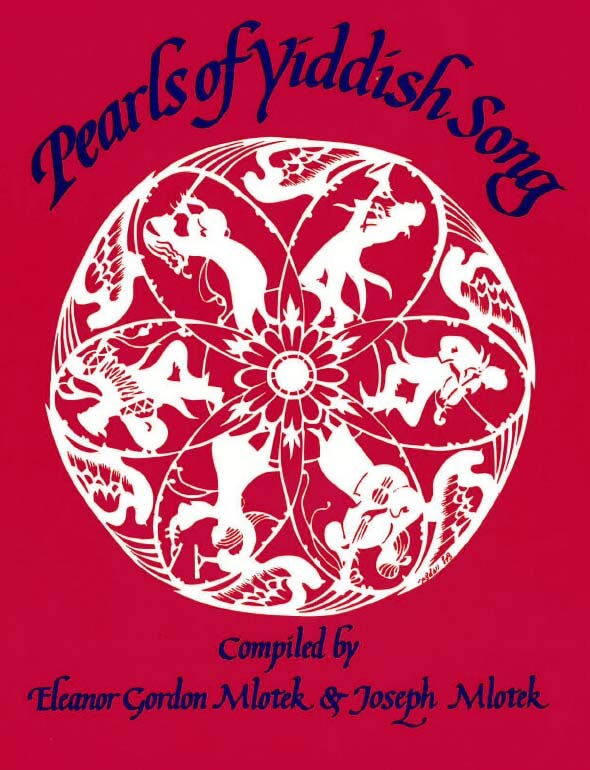Also entltled “Moyshelekh un Shloymelekh.” words by the poet Ḥayim Naḥman Bialik (1873-1934); melody by Platon G. Brounoff (apprx. 1863-1924). Published in sheet music by S. Goldberg, N.Y., 1905. A second melody published by Leo Kopf in 1914 is also presented here.
In 1922 Rumanian folk poet Shimshon Fersht (1886-1968) paraphrased the lines in a song about pogrom victims: “Unter di grininke beymelekh/Valgern zikh Moyshelekh, Shloymelekh” (Beneath the little green trees, Moyshelekh and Shloymelekh are homeless). This evolved into an indictment: “In the Russian forests, our Jewish boys fought like heroes for the Russian army. Pogroms and fires were Russian games, burning Jewish synagogues and slaughtering Jews like lambs, this the Russian ‘lords’ know how to do well.”
The song’s title was adopted as the title of a collection of children’s songs published in Vilna between the wars. Later, the song served as the prototype for a Holocaust song by I. Papiernikov (b. 1899), music by I. Alter: “Unter di poylishe grininke beymelekh,/Shpiln zikh mer nit keyn Moyshelekh, Shloymelekh” (Beneath the Polish little green trees, no longer play any Moyshelekh and Shloymelekh). Published by S. Bugatch in 1951 and in sheet music by Hensley Music, N.Y. 1965.

Beneath the little green trees,
little Moysheles and Shloymeles play.
With their fringes, little frock coats and peyes,
little Jews, freshly hatched.
Little bodies made of straw, smoke and feathers
if you only blew on them they would take flight
gentle winds could lift them up
and little birds carry them away…
But one thing they do have is eyes,
their eyes have a pair of pupils
that glow and blink and sparkle
prophetic and marvelous.
They deliberate and contemplate
impossible visions and little birds.
Oh, may you be spared*, Jewish children,
for the sake of your pure little eyes!
*Note: mir zol zayn is the shortening of an expression that offers oneself as a sacrifice to substitute for someone else. Typically, Mir zol zayn far ayere beydelekh, “Let it be me for [rather than harm coming to] your little bones.”
Note: peyes (or, sometimes, peyot) = sidelocks.
Also note: A mistake in the original translation has “nekhtike teg” referring to the past, when it is an idiom referring to the imaginary or, more often, to the impossible.
Unter di grininke beymelekh
Shpiln zikh Moyshelekh, Shleymelekh,
Tsitses, kapotkelekh, peyelekh,
Yidelekh, frish fun di eyelekh.
Gufimlekh shtroy, roykh un federlekh,
Khotsh nem un tsebloz zey oyf gliderlekh,
Khapn zey oyf gringe vintelekh,
Un es tsetrogn zey feygelekh.
Nor eyn zakh farmogn zey — eygelekh,
Di eygelekh farmogn tsvey pintelekh,
Vos glien un finklen un tukn zikh
Un epes vi neviish un vunderlekh.
Fartrakhtn zikh tif un farkukn zikh
Oyf nekhtike teg un oyf feygelekh,
Oy, mir zol zayn, yidishe kinderlekh,
Far ayere koshere eygelekh!…
אונטער די גרינינקע בײמעלעך
שפּילן זיך משהלעך, שלמהלעך,
ציצות, קאָפּאָטקעלעך, פּאַהלעך,
ייִדעלעך פֿריש פֿון די אײעלעך.
נופֿימלעך, שטרױ, רױך און פֿעדערלעך,
כאָטש נעם און צעבלאָז זי אױף נלידערלעך:
כאַפּן זי אױף גרינגע װינטעלעך,
און עס צעטראָגן זי פֿײגעלעך.
נאָר אײן זאַך פֿאַרמאָגן זײ — אײגעלעך,
די אײגעלעך פֿאַרמאָגן צװײ פּינטעלעך,
װאָס נליִען און פֿינקלען און טוקן זיך
און עפּעס װי נבֿיאיש און װוּנדערלעך.
פֿאַרטראַכטן זיך טיף און פֿאַרקוקן זיך
אױף נעכטיקע טעג און אױף פֿײגעלעך,
אױ, מיר זאָל זײַן, ייִדישע קינדערלעך,
פֿאַר אײַערע כּשרע אײגעלעך!
Song Title: Unter Di Grininke Beymelekh

First published in 1988 as Pearls of Yiddish Song: Favorite Folk, Art and Theatre Songs, this anthology contains 115 songs. Some material had never been published, while others, included in rare song collections or sheet music, were largely inaccessible. The songs presented reflect Jewish life in Eastern Europe and the United States and depict childhood, love, family celebrations, poverty, work and struggle. There are also songs from the Hasidic and Maskilic movements, songs of Zion and of America, as well as songs from the Yiddish theater.
The title of this anthology derives from the weekly two-page feature column “Pearls of Yiddish Poetry,” which the compilers Yosl and Chana Mlotek initiated in 1970 in the Yiddish newspaper Der Forvertz (the Yiddish Daily Forward). Hundreds of readers from around the world — including authors, composers, singers, actors — became co-participants in this collective folk project and recalled melodies, lines, fragments, stanzas and their variants of songs, poems, and plays which they had heard in their youth. At first, readers sent in only written material. Later, they also taped songs on cassettes, many of whose melodies had, until then, never been recorded. They also identified and supplied missing information regarding lyricists, poets, and composers and described the circumstances surrounding the songs’ origins, their dissemination, diffusion and impact.